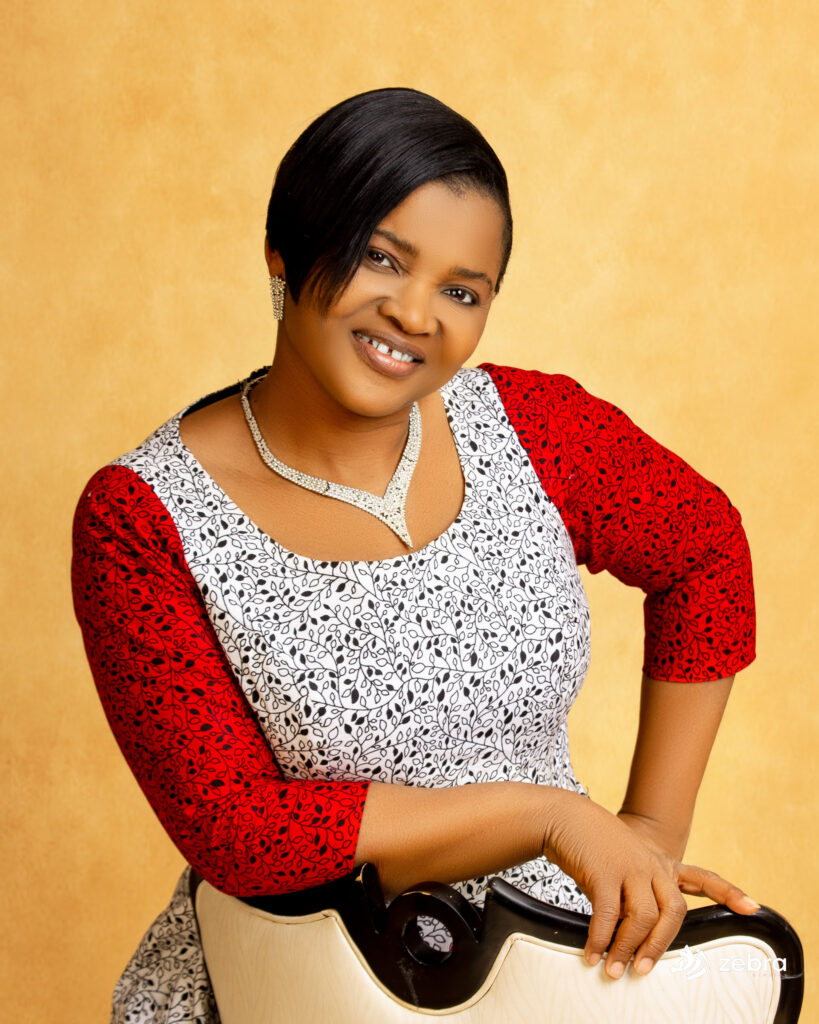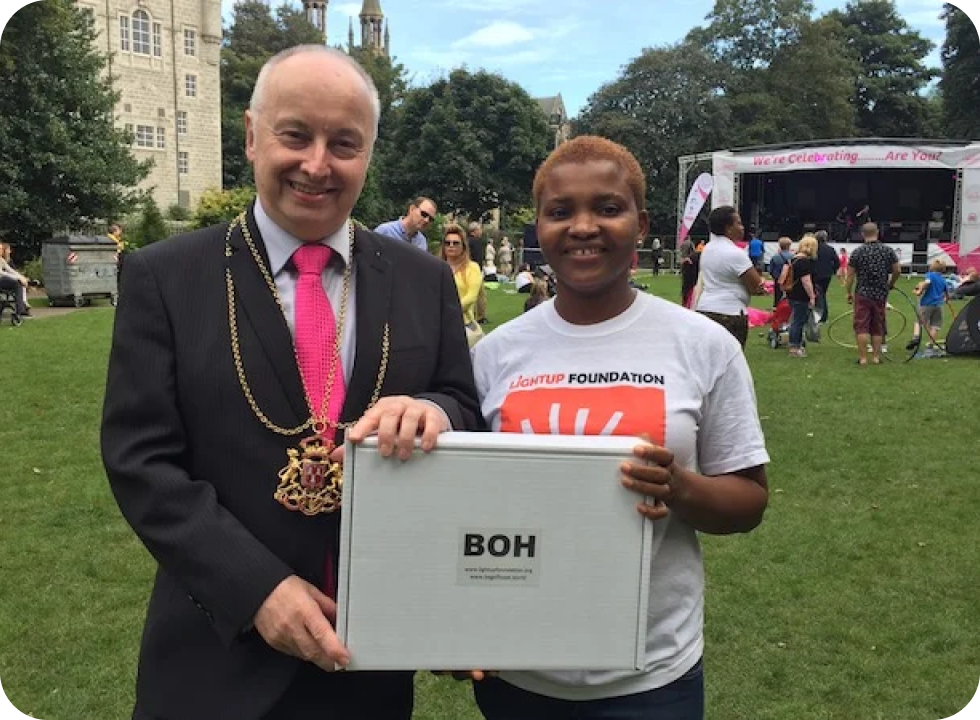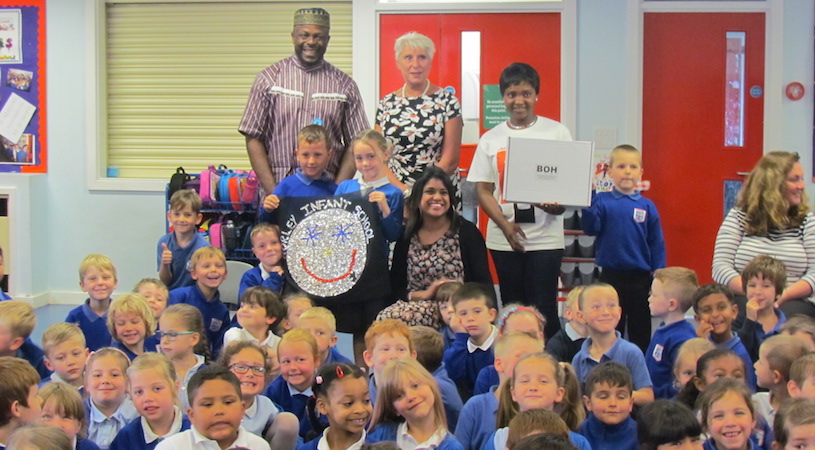Leadership
Team
Executive Director


Olasubomi Iginla Aina MBE.
Olasubomi is the Executive Director of Lightup Foundation, a post she has held for over 24 years. Within this period, Lightup has broken a world record with the “Bag of Hope” project used to project the UN Rights of the Child targeting 30 countries. She has been wholeheartedly committed in this role since Lightup was established in Africa at the turn of the millennium, now marking almost a quarter of a century of dedicated and impactful hardwork. Her leadership in this role has been characterized by a hands-on approach, actively engaging with communities and fostering volunteerism and better life for the disadvantaged.
She holds a Masters in law (LLM) from Brighton University, (UK), studied Generative Leadership course at Oxford University and holds a Bachelors Degree in Architecture from the great Obafemi Awolowo University, Ile-Ife, Nigeria where she served as the Vice President and later became the President of the Students’ Union.
Olasubomi is a woman of many hats within the humanitarian space, and her contributions within this space have brought her recognition nationally and internationally.
In 2019, she was nominated by the UK Prime Minister to be honoured by Her Majesty the late Queen of England with the appointment as a Member of the Most Excellent Order of the British Empire (MBE) for her work with the youths and the disadvantaged in Africa and UK.
Precisely In 2021, she won a global election to become a Director of the Global NGO Executive Committee (GNEC), making her one of the 18 elected board members liaising for global NGO to the United Nations.
During President Obasanjo’s regime, she became the most active Focal person for the National Women Peace Group (NAWOPEG) in Nigeria, inaugurated by President Olusegun Obasanjo, and she was actively involved in the preparation of the youth Policy Document for Nigeria.
In December 2019 during President Buhari’s administration, she was appointed as the Diaspora Ambassador for Nigeria and the National Assembly Ambassador to the UK.
Olasubomi has organized various programmes and activities on youth issues at international, national and local levels. She has also delivered many keynote addresses, papers, presentations, and speeches, globally, on various youth-related and humanitarian issues.
In addition, she has also contributed to the drafting of numerous youth strategies at regional and international levels. She believes in empowering youth, and with that passion, she was made the Minister of Youth for the State of African Diaspora (SOAD) – the African Diaspora being the 6th region of Africa.
She has continued to support people through some of their most challenging times and crises – both in the UK and around the world. Her relentless dedication to humanitarian causes has made a significant impact on countless lives, showcasing her commitment to social justice and equality.
Her journey began at a young age, and her selfless service has spanned close to three decades. She has been involved in various initiatives aimed at shaping policies, uplifting marginalized communities, advocating for their rights, and mobilizing resources/essential support globally during crises. Her work is characterized by a deep compassion for others and a strong belief in the power of community engagement. Olasubomi’s work is marked by a unique blend of grassroots activism and systemic change, particularly in her commitment to youth development.
Dr Louis-Georges Tin, Prime Minister of the State of the African Diaspora, highlights Olasubomi’s exceptional bravery and dedication:
“Olasubomi is highly respected in her field, courting support and praise from senior government and charitable leaders all around the world.”
She has gained so much respect in the humanitarian field and this respect is not only due to her extensive work in this field but also her ability to inspire others to join her cause. Her impact is felt globally, as she has worked tirelessly to address issues such as displacement, discrimination, and social injustice. Olasubomi’s ability to mobilize resources and create networks has been instrumental in her efforts to bring about meaningful change. Her work has not only transformed individual lives but has also contributed to broader societal shifts, making her a pivotal figure in the fight for equality and justice.
Tangible Achievements
Olasubomi’s career is marked by numerous tangible achievements that reflect her unwavering commitment to humanitarian causes. Her work has led to significant policy changes, community development initiatives, and the empowerment of marginalized groups all through her career (current and former).
Moreover, her commitment to youth development is evident in her work with the Lightup Foundation. Under the umbrella of Lightup Foundation, Olasubomi has spearheaded various initiatives to promote its vision and her impact is felt in numerous countries where she has actively engaged with local and international stakeholders to create sustainable solutions.
Her ability to engage young people in meaningful ways has empowered them to become advocates for change within their own communities and this has attracted outstanding remarks about Lightup Foundation, the organisation she leads, from notable world leaders.
My work with Lightup

Olasubomi is the embodiment of true passion, grace, selflessness, generosity, humanity and love. Her work has become well known and featured internationally across various media outlets including the London Gazette, Washington Post, Punch, The Sun newspaper, Croydon Advertiser, Surrey Mirror. She has also featured on many radio programmes as well as on television stations like Canada TV, Ben TV, Passion TV, African Independent Television (AIT), Television Continental (TVC), Channels TV, etc.
She was celebrated as a GOOD SAMARITAN on the BBC One Show, caught on camera shopping for elderly people in her local area (New Addington) in 2010. She was picked up by the film crew who had been diverted to New Addington from a planned trip to Scotland due to poor weather, a typical example of her many impromptu acts of kindness and generosity.
Olasubomi has been involved in many schemes and initiatives but if any one of those could define her, it would be the Bag of Hope. The Bag of Hope (BOH) is a unique global project designed and funded by her. The Bag of Hope is huge both in its actual manifestation and in its spectacular range and vision. This is the largest canvas bag in the world, a physical embodiment of hope. It was recognised in the Guinness Book of Records on the 24th of November 2015.
However, more significant is the fact that the Bag of Hope is a symbol and a rallying point around which activities are run to raise awareness of the UN Rights of the Child. This is a vehicle to engage and empower young people and to mobilise them and make them aware of the issues surrounding child abuse and child protection. The Bag of Hope sets out to challenge parents, teachers, politicians and policy makers to make positive changes to improve the lives of children all over the world.
The Bag is a physical receptacle of the hopes and dreams of young people all over the world. Olasubomi organised and funded the creation of this bag in Africa on the 1st of November 2015. Hundreds of children both educated and uneducated were involved in the design and creation of the BOH, which has received wide publicity in the news. This is a link to the documentary produced for the BOH project: https://www.youtube.com/watch?v=cb-3DbJwd1U
In 2014, there was an alarming increase in Islamophobic crime in Croydon representing over one hundred percent increase from December 2014 to December 2015. This link will tell you more. http://www.met.police.uk/crimefigures/datatable.phpborough=zd&period=year
Consequently, Ola decided to start working with young Muslim girls and boys, using the Lightup Foundation platform to offer support and counselling. She organised training and support sessions for young Muslims to teach them problem-solving skills, mind-focusing and confidence-boosting techniques to assist them in their daily activities. This was also crucial in helping them to manage the rise in hate crimes and anti-Islamic sentiments within their communities.



The participants all endorsed the sessions as incredibly beneficial and indicated that they wanted them to continue. This scheme has been running for over four years now. The use of mentoring techniques have indicated that the training given to these young Muslims will have a far greater reach than just those taking part from the Alkhair Muslim community.
Olasubomi is keen to reach those young people who are disadvantaged and who may have already lost their way. This may be amply demonstrated by her work with inmates at both Brixton Prison and Downview Prison in Carshalton alongside a religious minister from Croydon Tabernacle. Their prison visits are often organised at short notice and offer counselling and support to young inmates.
In 2009 and 2010, Ola sacrificed some of her own festive celebrations with her family on Christmas day to spend time with the young people in Downview Prison who were without visitors. Her non-judgemental approach and the way she gives herself wholly to this cause has gained the confidence of many of the prisoners and promoted a spirit of engagement and access.
Olasubomi’s prison work is not confined solely to the United Kingdom. In 2014, she started working with young offenders overseas at the Borstal Prison in Abeokuta, Ogun State, Nigeria. Again, the work was practically the same: organising motivational training sessions, offering counselling and support, and, often, just simply giving comfort when required. This work is personally funded by her, with only occasional and sporadic donations from those who believe in her cause. Using the Lightup Foundation platform, she organises visitors to counsel the inmates and visits the prison herself each year to offer what support she can via personal sessions.
Such is the transient nature of the prison population that the first young people she worked with in 2014, around two hundred in number, have since been released. The batch she worked with in 2020 is close to 400 inmates at Abeokuta, Ogun State Borstal. In Nigeria, she has worked with an estimated total of over 2,000 inmates from 2014 to date. She provides support in many and every form including impromptu funding to transport prisoners home when they have been released and money for toiletries and other personal essentials.
Olasubomi’s work in both British and Nigerian prisons has made an enormous impact on the lives of so many young prisoners. Her assistance is now being actively sought by other prisons and penal institutions to support their inmates. On an annual basis, she funds talent productions and Christmas parties, providing food and gifts for each and every child. The Nigerian Borstal Prison authorities in Ogun State now use the Lightup Foundation tee-shirt as their official uniform. This is personally funded by Olasubomi. A lot of the young people only have tattered clothing, and the opportunity of wearing something smart and new at official events has really increased their self-worth.
She commenced motivational sessions with another Borstal corrective facility in Kwara State, Nigeria. This happened due to her successful work in the Borstal at Abeokuta, Ogun State. Again, using her own funds, counselling sessions were arranged for the young inmates, and she personally offered motivational training at this programme in August 2017. These sessions have had a very positive and encouraging impact on the participants. Two years earlier in 2015, Olasubomi also volunteered to work in the adult Ibara Prison, Abeokuta and also Sagamu Prison. She donated items to provide personal assistance, she offered financial help in the form of bail costs for certain prisoners and she organised motivational sessions. Above all, she gave them her time and her attention, engaging with them, counselling them and praying with them.
Olasubomi’s works have an international reach but she does not overlook what is right under her nose in her own community. In 2012, she had a great idea to start to organise a community Christmas party in New Addington. Hence, she started organising the Christmas party for the children of New Addington. She runs the party on behalf of the Gateway Church, New Addington and it has been a successful feature of community life for the past seven years. Part of the event is organised in collaboration with Croydon Council Food Bank Project, and it involves the distribution of food baskets to the less privileged and vulnerable within the community. The event is mostly funded by the Gateway Church, but Olasubomi only assists with project organisation; and her passion brings it to life and ensures that the entire community benefits from it.
She moved to a different area in 2013 and immediately began the same initiative in her new community, Smallfield and Horley. She funds this event entirely herself including the provision of food and drinks, beautifully wrapped gifts for each participating child and festive entertainment. This event has been very popular and was broadened in 2017 to include adults with huge success and acclaim. It is the only community event in this area that brings everyone together and has created new friendships and networks across all the generations.
After the London riots, Olasubomi decided to dig a little deeper. She was intrigued by the root cause of the anti-social behaviour displayed by young people and why they would want to destroy the assets in their community in a protest. On behalf of Lightup Foundation and on a completely self-funded basis initially, she organised an inter-school debate on the 4th of October 2011.
150 young people as well as a BBC researcher were present and other relevant organisations. The discussion revolved around the cause of the riots and how future occurrences could be prevented. The debate established that certainly one of the causes of this violent behaviour was that young people lacked any sense of ownership and pride in their community. When they felt overlooked by government, it was easy to damage things that appeared to be of no value to them.
Following the debate, Olasubomi embarked on various youth consultations, talks and road shows within Tottenham and Croydon. Further research revealed a disconnection between young people and the communities where they were living and it begged the question, why did they not set fire to their own houses? The conclusion she reached was that most young people did not view the community as theirs. They did not feel they had a stake in it and that it was their heritage.
Armed with this research, Olasubomi decided to create a Heritage project with the sole aim of connecting young people to their communities. The intention was to make them understand the history of their community, create awareness of cultural and historical assets and thereby encourage them to celebrate where they lived and develop pride in their surroundings.
Lightup Foundation executed the project in 2013/2014, delegated initially by Olasubomi as she was on maternity leave. However, the project nearly floundered, due to unforeseen circumstances. Olasubomi immediately had to resume active work to save the situation, most especially, for the stability of the young participants. So, she stepped in to lead the project forward.
She smartly coordinated a team of partners and supporters including the Royal Institute of British Architecture (RIBA), Haringey Libraries, Bruce Castle Museum, St. Mary’s Catholic High School, John Loughborough School, Parkview Academy School and Croydon Local Studies Library and Archives Service. There were also local businesses involved who had suffered as a result of the damage caused by the rioters. There were exchange tours between Croydon and Haringey so the two groups could explore and share each other’s findings. The outcome of this collaboration was exhibited in schools, youth clubs, on social networking sites and in other public places within the two boroughs.
From this project came another outcome, i.e. 2 different magazines, the First Youth Heritage Magazine for Croydon and Haringey. Ten thousand copies of this innovative publication were produced across both boroughs. Olasubomi organised a memorable magazine launch to showcase the project which was attended by the Mayor and other local dignitaries.
The magazine has seen a wide distribution, to every secondary school, both state and private, special schools, libraries and youth clubs. Her overriding ambition is that young people understand the need and importance of making a positive impact on the lives of others. The children who participated in the project learned many new life skills which they have been able to use again within their own communities and to benefit others. There has been significant outreach from the project within the adult community and the overall success has been far greater than what was anticipated from the beginning. The achievement was marked by the Mayor of Croydon, who invited Olasubomi and all the young Croydon participants to the Mayor’s Parlour, where they all received badges from the Mayor in appreciation of their remarkable efforts towards the execution of the project.
LINKS TO IMPORTANT PROJECT INFORMATION:
Link to Haringey Independent newspaper’s press release:
http://www.haringeyindependent.co.uk/news/10399966.Foundation_secures___32_500_to_educate_young_people_about_local_heritage/
DOCUMENTARY FOR THE 2 BOROUGHS
Documentary of Haringey High Road
Documentary of Croydon High Street
NEWSPAPER PUBLICATION ON AWARD CEREMONY AND MAGAZINE LAUNCH
http://www.haringeyindependent.co.uk/news/10845761.Teenagers_launch_heritage_magazine/
AWARD CEREMONY AND MAGAZINE LAUNCH (On YouTube)
Croydon link: http://www.youtube.com/watch?v=GKddGpsMGbQ
Haringey Link: http://www.youtube.com/watch?v=2X3DTAnl47w&feature=youtu.be
On the 8th of January 2018, Olasubomi started a nursery/primary school project for the less privileged in Ikhare Island settlement in Lagos Sate using the Lightup Foundation platform. This project is being currently funded solely by her. The settlement is remote, surrounded by the sea and highly impoverished. Many of the children there do not receive any form of formal education as they are required to work.
Additionally, there is no free education within this community and the only free schools available are outside the community. This will require travelling across a body of water. The journey also needs to be funded; automatically putting education firmly beyond the reach of most families in the settlement. Lack of education ensures the continuity of the cycle of poverty and under-development.
Olasubomi’s project has created a school which offers free and quality education to the children from the Ikhare community. The initiative was applauded and welcomed by the local people and celebrated by their king and other local leaders.
Olasubomi’s life has been dedicated to the service of others from a young age. This drive first came to prominence when she was at the University, where her leadership skills became apparent. She started studying Architecture at the Obafemi Awolowo University, Ile-Ife in 1996. This was one of the best Universities in Africa but that period was a time of great trouble and political unrest in higher institutions. She contested during the students’ union elections and became Vice President of the Students’ Union, famously on an election campaign with a zero budget, unlike her competitors. She simply used her creativity as a substitute for lack of funds; and this is an early illustration of how she is always able to get right to the centre of an issue and deliver solutions.
The University was in crisis and the then President of the Students’ Union, under whom she served as Deputy, was active in stirring up trouble and unrest, advocating militancy and violence amongst the students population to resolve a long-standing issue revolving around the re-instatement of thirteen union leaders. These thirteen students had been expelled for campaigning for the welfare of the students and for organising a rally against the extra-judicial killing of Ken Saro Wiwa and eight other Ogoni activists under the despotic administration of the then Vice-Chancellor, Professor Wale Omole and the military junta of General Sani Abacha. These student activists had been rusticated in 1995 before Olasubomi gained admission into the University. This had formed a focal point for riots and violent behaviour, causing injury and death, and significant disruption to academic activities. The situation was sufficiently serious to warrant coverage in the national newspapers of the time.
Whilst this was ongoing, there was also a serious massacre on the 10th July 1999, by secret cult members operating at the University. They executed five students, including some leaders of the Student Union. Rumours abounded that the University authorities were behind these murders and the situation between the students and the University leaders began to spiral out of control. Despite this tense situation, Olasubomi showed incredible courage and still went ahead to contest to become a student leader. She got involved in the situation with the sole intent of resolving the massive crisis on the ground.
A few months after winning her election and gaining appointment as the Vice President of the Students’ Union, the President of the Union once again opted for the usual route of violence as a tool to resolve the issues facing the student body. Ultimately, he was suspended and this was when Olasubomi’s influence really came to the fore.
She organised a demonstration in support of the rusticated students. This demonstration was peaceful, unheard of in the recent history of the University, and a beacon of hope going forward with colossal impact. She engaged, not only with the student population to win their trust, but also with University authorities. Being a female President of the Students’ Union was, in itself, a remarkable achievement. She demonstrated an innate ability to bridge the gap between the warring students and the University Council and her tenure as President of the Students’ Union had a huge impact on the life of the University from that point onwards.
As a result of her inspirational leadership style, the school authorities worked with her to reinstate the thirteen rusticated Students’ Union leaders. These thirteen included, Anthony Fashayo, popularly known as, Tony Fash, the Students’ Union President at the time who was a medical student. Today Anthony Fashayo has graduated and is now a medical doctor, helping others and saving lives.
As the President of the Students’ Union, she spoke and battled openly against cultism and she brought great hope, confidence and freedom to the female students who were much in the background and constantly relegated to a lower status.
Olasubomi’s time at the Obafemi Awolowo University led her to start the Organisation for Youths and Women Affairs, OYWA, which later developed into the Lightup Foundation. Her desire to help young people was already clearly tangible from her formative student years. Following Olasubomi’s remarkable impact at the Obafemi Awolowo University, in 2002, she became the youngest focal person for the National Women’s Peace Group, a group inaugurated by the then President of Nigeria, President Olusegun Obasanjo. She was then assigned responsibility for training women and young people in Lagos State in conflict management and the techniques of peace. She was the youngest of all the focal people selected to represent the thirty-six states in Nigeria and the Federal Capital Territory, Abuja.
This posting was highly controversial due to her age. Funding was not provided to support this role. However, lack of finance has never stopped Olasubomi from executing a project that she believes in. She used her own money to start training sessions in conflict management amongst all sectors – women, traditional leaders and politicians in Lagos State, and became the most active Focal person in Nigeria. She organised several notable rallies and was able to bring the young, the old and people from different backgrounds and beliefs together in a bid to promote mutual understanding and, thereby, peace in one of the most difficult and troubled states in Nigeria.
Notably, there was a problem between the Yoruba and Hausa, two major Nigerian ethnic groups, in Lagos, and she was able to bring the leaders of the two ethnic groups together to resolve their differences. She gained enormous fame because of the success of this project and the outcomes clearly demonstrate her indefatigable leadership skills.
This track record led Olasubomi to be invited by the Committee involved with the execution of the Commonwealth Heads of Government Meeting (CHOGM 2003) in Nigeria to plan a Pan-Commonwealth Project for Nigeria. She brought together over one hundred and twenty participants from Commonwealth countries to celebrate peace building under the banner, ‘The Nigerian Dream’.
In the course of executing this initiative, she resisted pressure to applaud well-known names, but instead, chose to highlight the input of the common man, who had been making his or her own contributions to peace-building in the community. The project was designed to reach out and touch the most ordinary person. It was harder to raise money since she refused to court the powerful and wealthy. Hence, she had to fund this initiative herself until just two days before the event at Abuja when the Nigerian National Petroleum Cooperation (NNPC) agreed to support her efforts. Gillian Dare, OBE, the first Secretary to the United Kingdom in Nigeria, the Swiss Ambassador and many other dignitaries were present at this event.
In 2003, when Olasubomi was twenty-five years old, the US Government became aware of her numerous acts of charity work and campaigning for women and young people. The US Embassy in Nigeria informed her that they wanted her to represent Nigeria in the US Department of States’ International Leadership Programme. The Embassy was convinced of her legitimacy and the impact of her achievements but remained concerned about her age. The selection process went on for over a year before she was finally chosen to represent Nigeria at the programme in Washington DC in 2004.
Upon arrival, she found herself surrounded by the Secretary of State and other high-profile political figures from other nations. She was given leadership training, the opportunity to monitor the 2004 US election and met political leaders and people of influence. This amazing opportunity gave her a fresh cultural perspective which served to strengthen her understanding of the world around her, reshaping her vision of what she wanted to achieve on her return to Nigeria. She renewed her focus, renaming OYWA as ‘LIghtup Foundation’ with the wider aim of supporting youth development as well as encouraging volunteerism.
Olasubomi is driven to help young people but will stop and help anyone on her journey who needs assistance. She will always engage and contribute wherever there are people in need. Even though she has her planned projects, she will never walk away from an appeal for help. Moved by the plight of the dying population, she assisted with a food rescue operation in Niger Republic in 2005. She sold most of her inheritance to help feed the dying population of Gari Isi, Gari Iddi and Gari Maigimi during the deadly drought and to transport volunteers and food to these starving people from Nigeria.
Her team received a warm welcome by the rulers, and they helped to save the lives of many people. She gave particular attention to the disabled and widows and the rescue mission was covered by the Washington Post newspaper in 2005, as well as numerous television stations. After her return to the UK, she inspired others to come and work with her, some people joined her after they were touched by her love and passion following interviews and features on different UK television networks.
After marrying and relocating to the UK, Olasubomi continued her role as the Executive Director of Lightup Foundation, a role she has fulfilled on a voluntary basis for close to 20 years after the formal inauguration of her organisation at the University. She is responsible for overseeing the day-to-day operations of the Foundation and delivering community programmes to the highest standards of excellence. Her strong organisational skills combined with an infectious and engaging personality have enabled her to thrive in this role, promoting stronger bonds within the communities that she touches.
Olasubomi visits other countries, including Nigeria, on an annual basis to deliver projects, one of which is the ‘Let’s Talk’ project. ‘Let’s Talk’ is a youth development training and counselling project which operates in different states, e.g. Lagos, Ogun and Oyo States. She has used this project to reach and empower, well over, ten thousand young people. As part of this project, she meets with school authorities to discuss any important findings during counselling sessions. She also identifies any promising student who was experiencing financial difficulties that might result in the abandonment of their education. On an annual basis, she provides scholarship support to them so that they could continue their studies.
She provides scholarships annually to assist the less-privileged students. In 2017/2018, she provided, at least, ten scholarships to children who were unable to continue in mainstream education. So far, she has provided approximately 40 scholarships up till 2020. She has also provided micro grants to impoverished parents and citizens in Oyo State to enable them to better support their families.
‘Let’s Talk’ has been running now for over ten years and is funded solely by Olasubomi without any other external form of financial assistance. The project represents one of the founding tenets of her life, which is communication with children and young people. ‘Let’s Talk’ is the perfect moniker for an initiative which offers counselling and support to young people in need. Able to relate to youth on their own level, she uses creativity and originality to connect with them and give all of herself without question.
Her ability to relate to young people is inspirational and she possesses an incredible knack of finding creative ideas to access the psyche of the young so that they will open up to her. She listens to them without censor or judgement. Olasubomi is physically of small stature and during the sessions for the ‘Let’s Talk’ project, she comes among the children wearing their own uniform. She becomes one of them and because of that, she is able to reach their minds to help them and achieve more tangible results.
Olasubomi has shown both humility and selflessness in helping other people across a range of projects and initiatives through Lightup Foundation, all diverse, original and all bearing the hallmark of her inspirational leadership skills. She gives of herself freely and her time and money in the service of humanity. She is unique not just in her desire to help others but in the tremendous reach she has to young people, both in terms of the staggering breadth of her work and her ability to connect with individuals.

